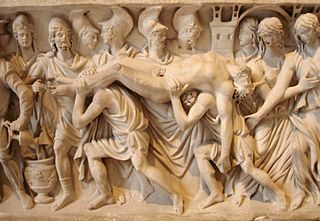
In Greek mythology, Hector is a character in Homer's Iliad. He was a Trojan prince and the greatest warrior for Troy during the Trojan War. Hector led the Trojans and their allies in the defense of Troy, killing countless Greek warriors. He was ultimately killed in single combat by Achilles, who later dragged his dead body around the city of Troy behind his chariot.

Orlando furioso is an Italian epic poem by Ludovico Ariosto which has exerted a wide influence on later culture. The earliest version appeared in 1516, although the poem was not published in its complete form until 1532. Orlando furioso is a continuation of Matteo Maria Boiardo's unfinished romance Orlando innamorato. In its historical setting and characters, it shares some features with the Old French Chanson de Roland of the eleventh century, which tells of the death of Roland. The story is also a chivalric romance which stemmed from a tradition beginning in the late Middle Ages and continuing in popularity in the 16th century and well into the 17th.

The Song of Roland is an 11th-century chanson de geste based on the Frankish military leader Roland at the Battle of Roncevaux Pass in 778 AD, during the reign of the Carolingian king Charlemagne. It is the oldest surviving major work of French literature. It exists in various manuscript versions, which testify to its enormous and enduring popularity in Medieval and Renaissance literature from the 12th to 16th centuries.

Renaud de Montauban was a legendary hero and knight which appeared in a 12th-century Old French chanson de geste known as The Four Sons of Aymon. The four sons of Duke Aymon are Renaud, Richard, Alard and Guiscard, and their cousin is the magician Maugris. Renaud possesses the magical horse Bayard and the sword Froberge.
The Rehearsal was a satirical play aimed specifically at John Dryden and generally at the sententious and overly ambitious theatre of the Restoration tragedy. The play was first staged on 7 December 1671 at the Theatre Royal, and published anonymously in 1672, but it is certainly by George Villiers, 2nd Duke of Buckingham and others. Several people have been suggested as collaborators, including Samuel Butler of Hudibras fame, Martin Clifford, and Thomas Sprat, a Royal Society founder and later Bishop of Rochester.
William Barnes Rhodes (1772–1826) was an English author, best known for his burlesque opera, Bombastes Furioso.
Bartlett's Familiar Quotations, often simply called Bartlett's, is an American reference work that is the longest-lived and most widely distributed collection of quotations. The book was first issued in 1855 and is currently in its nineteenth edition, published in 2022.
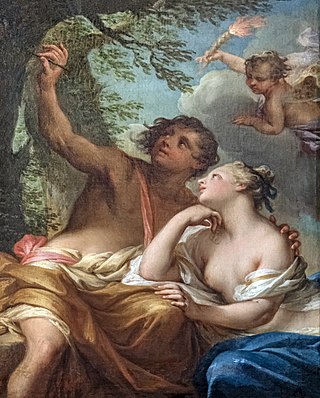
Orlando, usually known in modern times as Orlando furioso, is an opera in three acts by Antonio Vivaldi to an Italian libretto by Grazio Braccioli, based on Ludovico Ariosto's epic poem Orlando Furioso. The first performance of the opera was at the Teatro San Angelo, Venice, in November 1727. It is to be distinguished from an earlier Vivaldi opera of 1714, Orlando furioso, set to much the same libretto, once thought to be a revival of a 1713 opera by Giovanni Alberto Ristori but now considered by Vivaldian musicologists to be a fully-fledged opera by Vivaldi himself.
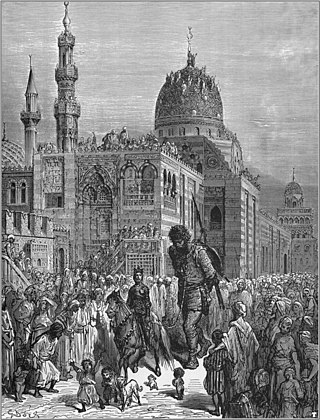
Astolfo is a fictional character in the Matter of France where he is one of Charlemagne's paladins. He is the son of Otto, the King of England, and is a cousin to Orlando and Rinaldo, and a descendant of Charles Martel. While Astolfo's name appeared in the Old French chanson de gesteThe Four Sons of Aymon, his first major appearance was in the anonymous early fourteenth-century Franco-Venetian epic poem La Prise de Pampelune. He was subsequently a major character in Italian Renaissance romance epics, such as Morgante by Luigi Pulci, Orlando Innamorato by Matteo Maria Boiardo, and Orlando Furioso by Ludovico Ariosto.

Bradamante is a fictional knight heroine in two epic poems of the Renaissance: Orlando Innamorato by Matteo Maria Boiardo and Orlando Furioso by Ludovico Ariosto. Since the poems exerted a wide influence on later culture, she became a recurring character in Western art.

Orlando is an opera seria in three acts by George Frideric Handel written for the King's Theatre in London in 1733. The Italian libretto was adapted from Carlo Sigismondo Capece's L'Orlando after Ludovico Ariosto's Orlando Furioso, which was also the source of Handel's operas Alcina and Ariodante. More an artistic than a popular success at its first performances, Orlando is today recognised as a masterpiece.

Oliver, sometimes referred to as Olivier de Vienne or de Gennes, is a legendary knight in the Matter of France chansons de geste, especially the French epic The Song of Roland. In the tradition, he was Roland's closest friend, advisor, confidant and brother-in-law to be, one of Charlemagne's twelve peers and brother of Aude, Roland's betrothed. He dies with Roland at the Battle of Roncevaux Pass. Some critics have linked his name to the olive tree, a biblical symbol of divine wisdom.
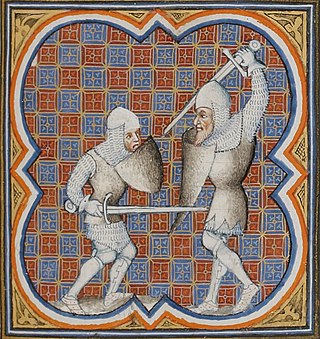
Ferragut was a character—a Saracen paladin, sometimes depicted as a giant—in texts dealing with the Matter of France, including the Historia Caroli Magni, and Italian epics, such as Orlando Innamorato by Matteo Maria Boiardo and Orlando Furioso by Ludovico Ariosto. In the tales, he was portrayed as physically invulnerable except at his navel/stomach, and was eventually killed by the paladin Roland.
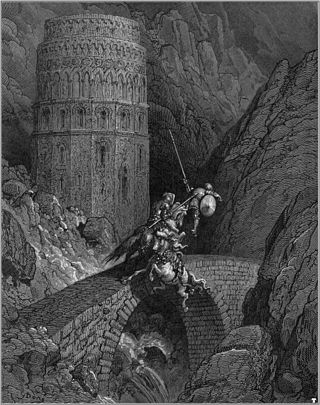
Rodomonte is a major character in the Italian romantic epic poems Orlando innamorato by Matteo Maria Boiardo and Orlando furioso by Ludovico Ariosto. He is the King of Sarza and Algiers and the leader of the Saracen army which besieges Charlemagne in Paris. He is in love with Doralice, Princess of Granada, but she elopes with his rival Mandricardo. He tries to seduce Isabella but she tricks him into killing her by mistake. In remorse, Rodomonte builds a bridge in her memory and forces all who cross it to pay tribute. When the "naked and mad" Orlando arrives at the bridge, it is Rodomonte, the pagan, who throws him into the river below. They both swim ashore, but Orlando who is naked and is unimpeded by heavy armor gets to the shore first. Finally, Rodomonte appears at the wedding of Bradamante and Ruggiero and accuses Ruggiero of treason for converting to Christianity and abandoning the Saracen cause. The two fight a duel and Rodomonte is killed.

Ruggiero is a leading character in the Italian romantic epics Orlando Innamorato by Matteo Maria Boiardo and Orlando Furioso by Ludovico Ariosto. Ruggiero had originally appeared in the twelfth-century French epic Aspremont, reworked by Andrea da Barberino as the chivalric romance Aspramonte. In Boiardo and Ariosto's works, he is supposed to be the ancestor of Boiardo and Ariosto's patrons, the Este family of Ferrara, and he plays a major role in the two poems.
Brunello is a character in the Italian romantic epics Orlando innamorato by Matteo Maria Boiardo and Orlando furioso by Ludovico Ariosto. Brunello is a dwarf and a cunning thief who works for the Saracen army of King Agramante. He first appears in the second book of Orlando innamorato where Agramante intends to invade Europe and defeat the Emperor Charlemagne. He has been told he has no chance of success unless he has the young warrior Ruggiero on his side, but Ruggiero has been hidden in a secret garden by the wizard Atlante and the only way to reach him is by using the magic ring belonging to Princess Angelica. Brunello undertakes to steal it and sets off for the fortress of Albracca where not only does he manage to snatch the ring but also robs King Sacripante of his horse and the female warrior Marfisa of her sword. Marfisa sets off in pursuit but Brunello evades her and gives the ring to Agramante, who rewards him with a kingdom. The Saracens find Ruggiero at Mount Carena where they see him behind a wall of glass. However, the wall is too steep and slippery to climb, so Brunello suggests they trick Ruggiero out. He gets them to play war games in the plain beneath the mountain. Ruggiero, with his inherent love of combat, cannot resist and in spite of Atlante's pleas he leaves the garden and begs Brunello for his horse and armour. Brunello only agrees if he will join their expedition against France, to which Ruggiero happily consents.
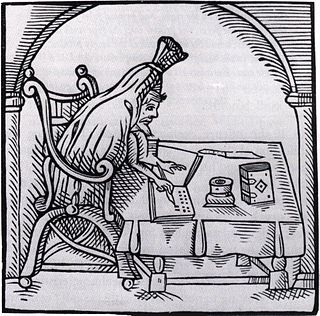
Robert Greene (1558–1592) was an English author popular in his day, and now best known for a posthumous pamphlet attributed to him, Greene's Groats-Worth of Witte, bought with a million of Repentance, widely believed to contain an attack on William Shakespeare. Robert Greene was a popular Elizabethan dramatist and pamphleteer known for his negative critiques of his colleagues. He is said to have been born in Norwich. He attended Cambridge where he received a BA in 1580, and an M.A. in 1583 before moving to London, where he arguably became the first professional author in England. Greene was prolific and published in many genres including romances, plays and autobiography.
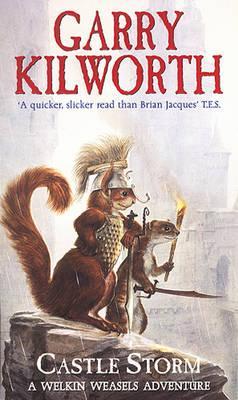
Castle Storm is the second novel in the Welkin Weasels series by Garry Kilworth. Picking up shortly after the end of Thunder Oak, the novel centres on the anthropomorphised weasels searching for the humans that mysteriously vanished from their homeland many years before. Following a clue found in the first book, the weasels, led by the outlaw Sylver and pursued by the stoat Sheriff Falshed, journey to a far-away city where they find themselves entangled in a battle between rivalling clans of squirrels. Published in Germany under the title "Belagert die Sturmburg."

Angelica and Medoro was a popular subject for Romantic painters, composers and writers from the 16th until the 19th century. Angelica and Medoro are two characters from the 16th-century Italian epic Orlando Furioso by Ludovico Ariosto. Angelica was an Asian princess at the court of Charlemagne who fell in love with the Saracen knight Medoro, and eloped with him to China. While in the original work, Orlando was the main character, many adaptations focused purely or mainly on the love between Angelica and Medoro, with the favourite scenes in paintings being Angelica nursing Medoro, and Angelica carving their names into a tree, a scene which was the theme of at least 25 paintings between 1577 and 1825.

Mandricardo is a character from the Matter of France, featured in the Italian romantic epic poems Orlando innamorato by Matteo Maria Boiardo and Orlando furioso by Ludovico Ariosto.
















